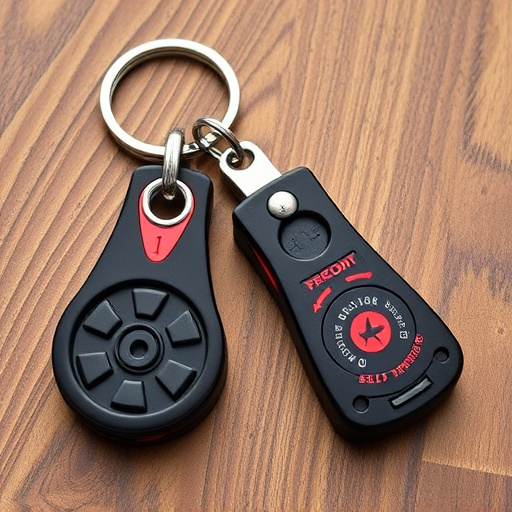Understanding self-defense keychain laws by state is crucial before carrying such devices, as regulations vary significantly. These laws dictate size, shape, materials, and permissible use scenarios. Familiarizing yourself with your state's rules ensures compliance, preventing legal issues for individuals adopting the Everyday Carry (EDC) concept with tactical keychains that combine defense and escape tools, but balancing public safety and personal protection requires knowledge of varying state laws.
In today’s world, being prepared for unexpected situations is paramount. One often-overlooked tool for everyday carry (EDC) defense is the tactical keychain. This comprehensive guide explores the legal considerations of self-defense keychains across various states, their role in enhancing personal safety, and how to choose the best option for your needs. Understanding Self-Defense Keychain Laws: A Comprehensive Guide offers insights into navigating state-specific regulations, ensuring peace of mind while empowering you with knowledge.
- Understanding Self-Defense Keychain Laws: A Comprehensive Guide
- The Role of a Tactical Keychain in Everyday Carry (EDC)
- State-by-State Legal Considerations for Self-Defense Keychains
- Choosing the Right Tactical Keychain for Your Needs and Peace of Mind
Understanding Self-Defense Keychain Laws: A Comprehensive Guide
Carrying a self-defense keychain may seem like a convenient way to protect yourself, but it’s crucial to understand the legal implications in your state. The laws surrounding self-defense keychains vary greatly by location, and what’s allowed in one state might be prohibited in another. For instance, some states have strict regulations on the type of weapons considered legal for personal defense, while others may not explicitly mention keychains at all.
Understanding Self-Defense Keychain Laws by State is essential before you consider carrying such a device. These laws can dictate the size, shape, and even the materials used in your keychain’s design. They also outline circumstances where using a self-defense keychain is permissible, often tied to situations of imminent threat or as a last resort when other means of escape are unavailable. Familiarize yourself with your state’s specific regulations to ensure compliance and avoid potential legal issues.
The Role of a Tactical Keychain in Everyday Carry (EDC)
In today’s world, where personal safety is a top priority for many individuals, the concept of Everyday Carry (EDC) has gained significant traction. EDC involves carrying essential tools and gadgets to enhance one’s ability to defend themselves in various situations. Among these tools, the tactical keychain stands out as a versatile and compact option that combines functionality with self-defense capabilities. A tactical keychain is more than just a convenient way to open doors; it can serve as a powerful tool for personal safety when faced with unexpected challenges.
These keychains are designed with various features like flashlights, sharp blades, or even pepper spray, making them multi-purpose tools. The role of a tactical keychain in EDC is twofold: it provides immediate access to self-defense mechanisms and can also serve as a last-resort escape tool. Moreover, understanding Self Defense Keychain Laws by State is crucial before incorporating such a device into your EDC setup. Different states have varying regulations regarding the carrying of self-defense tools, ensuring public safety while allowing individuals to protect themselves when necessary.
State-by-State Legal Considerations for Self-Defense Keychains
In the United States, the legal landscape surrounding self-defense keychains varies significantly from state to state. Understanding these variations is crucial for individuals looking to incorporate a tactical keychain into their everyday carry routine. Some states have relatively liberal laws allowing the open carry of certain types of weapons or tools for self-defense, while others impose stringent restrictions on the carrying of any weapon, including self-defense keychains.
For example, states like Texas and Kentucky permit the open carry of handguns without a license, but specific regulations govern the type of keychain that can be considered legal. In contrast, states like New York and California have strict gun control laws that may restrict or outright ban the possession of self-defense keychains, even if they are designed for non-lethal self-defense purposes. It’s essential to research and comply with local laws to avoid legal repercussions when carrying a self-defense keychain.
Choosing the Right Tactical Keychain for Your Needs and Peace of Mind
Choosing the right tactical keychain is more than just a matter of personal preference; it’s about finding a balance between utility, comfort, and legal compliance. With varying self-defense keychain laws by state, it’s crucial to research your local regulations before making a purchase. Owning a tactical keychain for everyday carry defense should never put you at risk of breaking the law.
Consider factors like material quality, durability, ease of use, and hidden carrying options when selecting a keychain. Look for materials that can withstand daily wear and tear, such as high-grade stainless steel or titanium. Ensure it fits comfortably in your hand and allows for swift deployment if needed. Remember, the peace of mind that comes from being prepared and knowing you’re within legal boundaries is invaluable.
In conclusion, a tactical keychain can be an effective everyday carry (EDC) tool for personal defense, but it’s crucial to understand the self-defense keychain laws by state. By considering your specific needs and staying informed about legal considerations, you can choose the right tactical keychain that provides peace of mind without compromising legality. Remember, knowledge is power, especially when it comes to protecting yourself and navigating Self Defense Keychain Laws by State.
